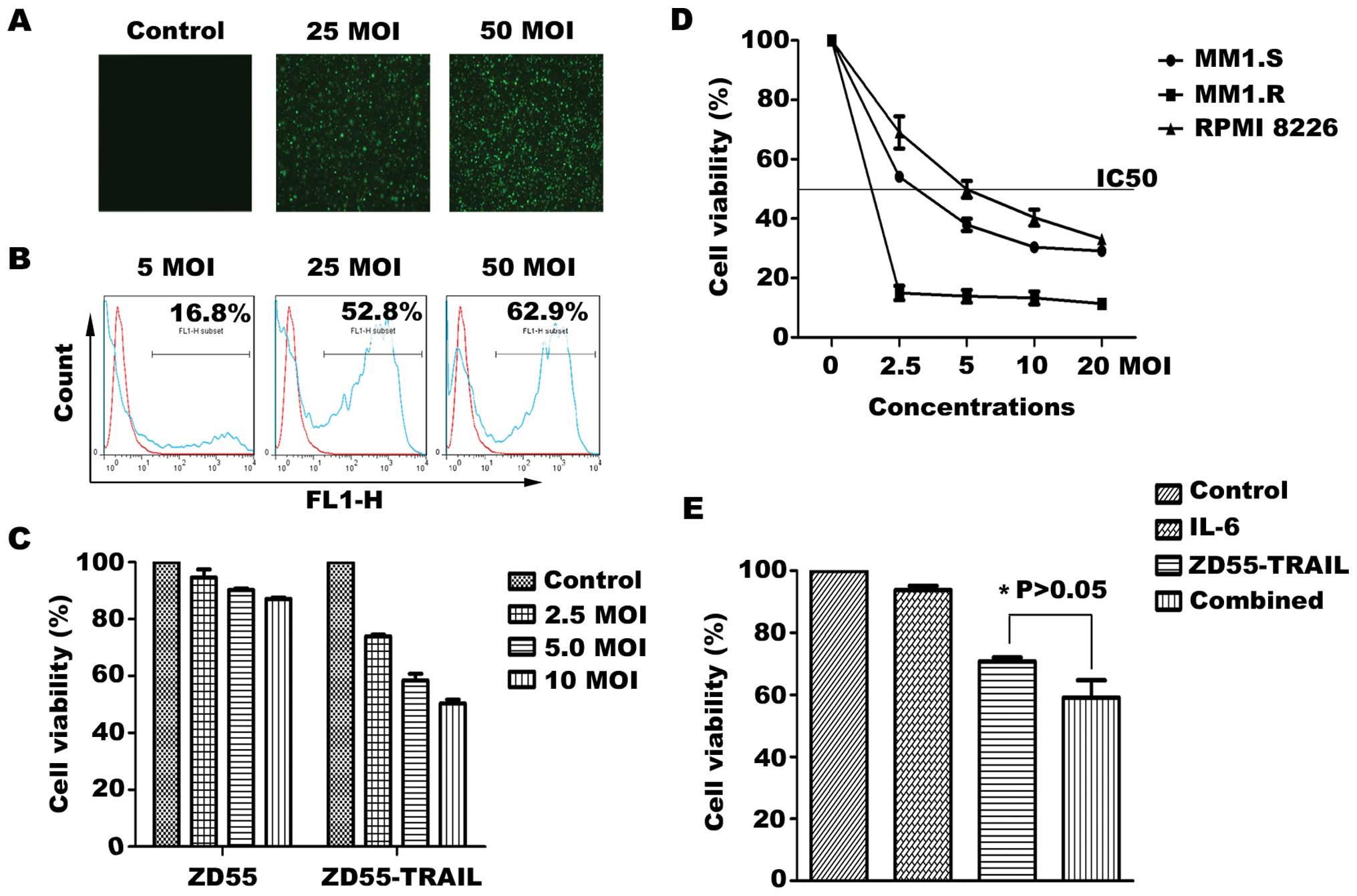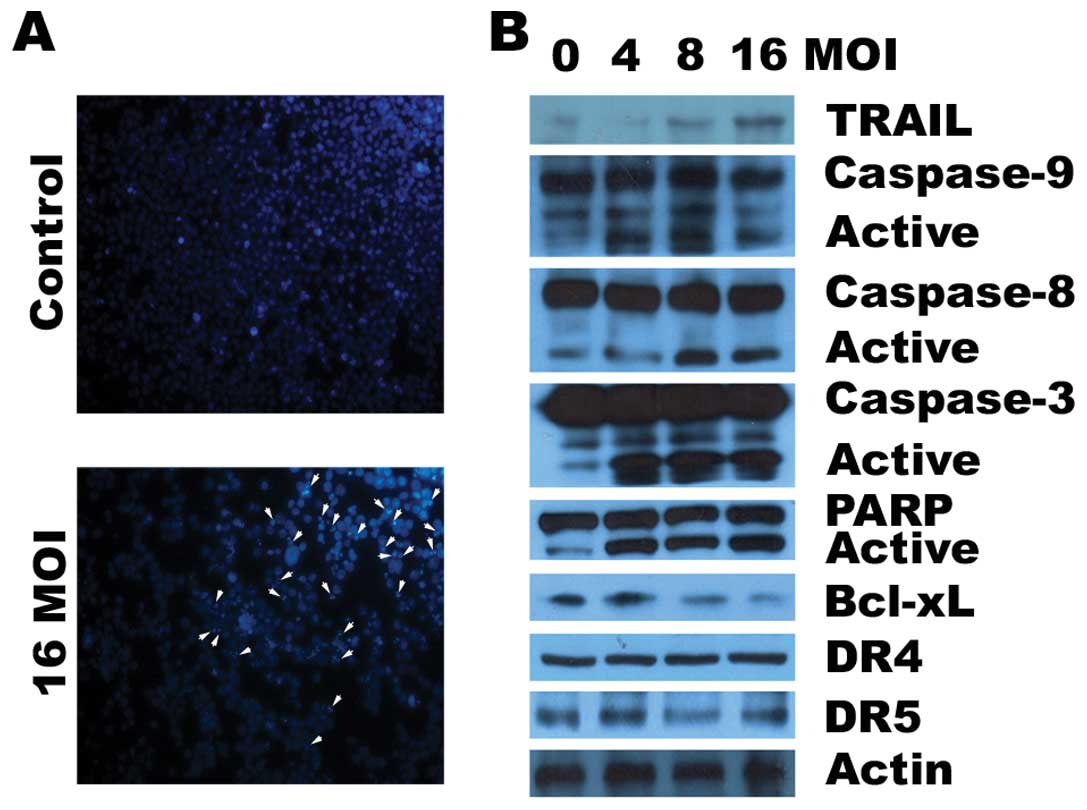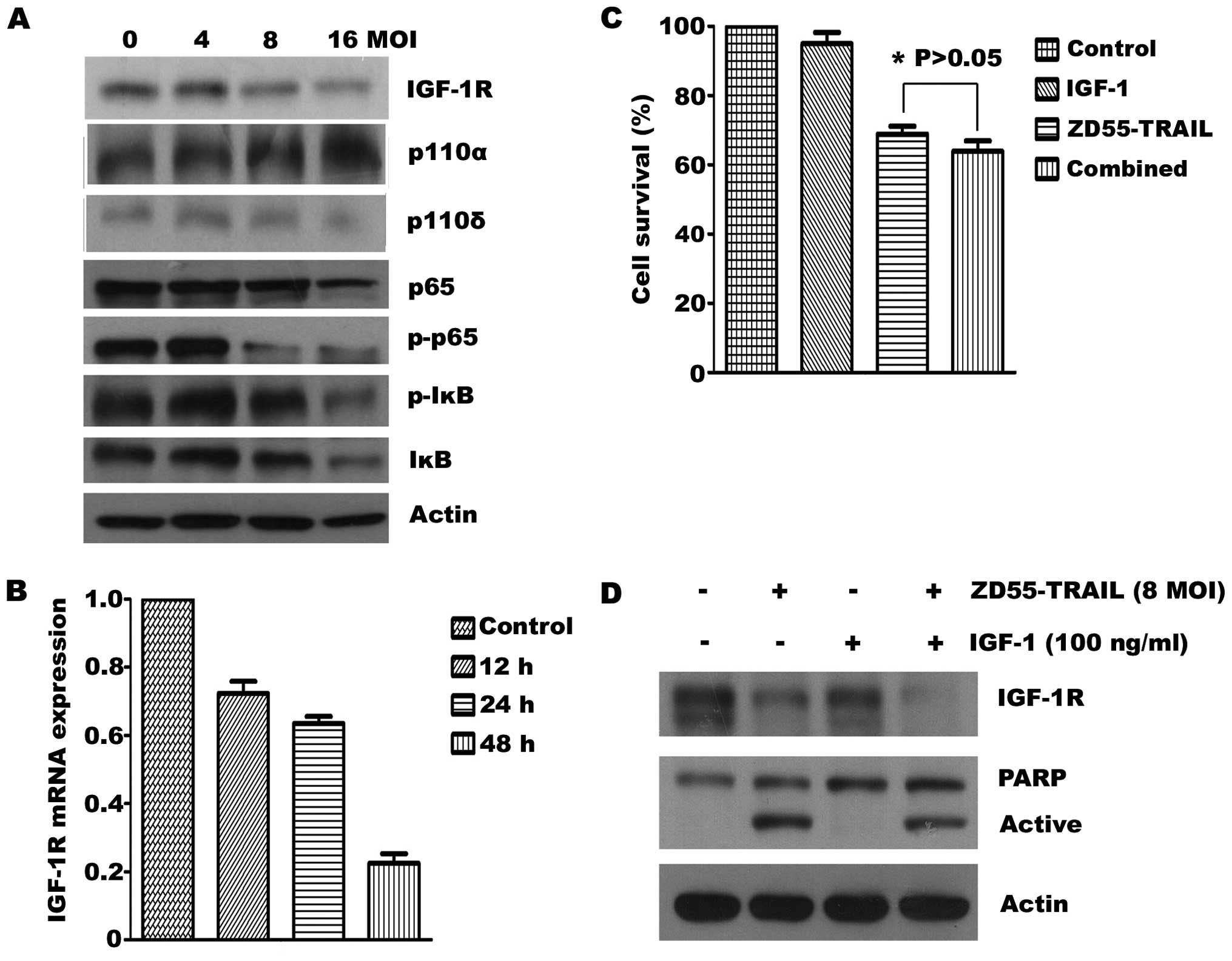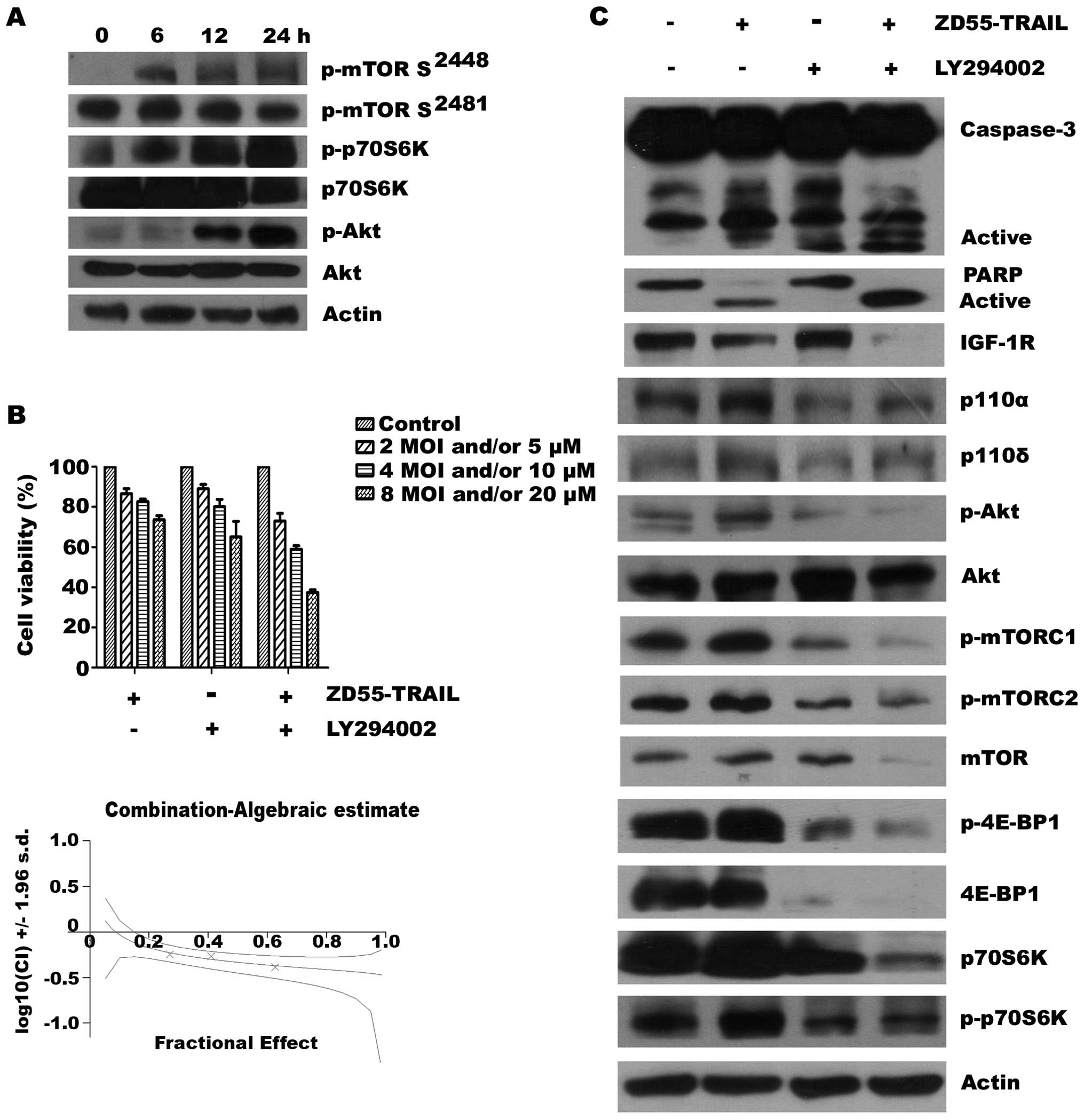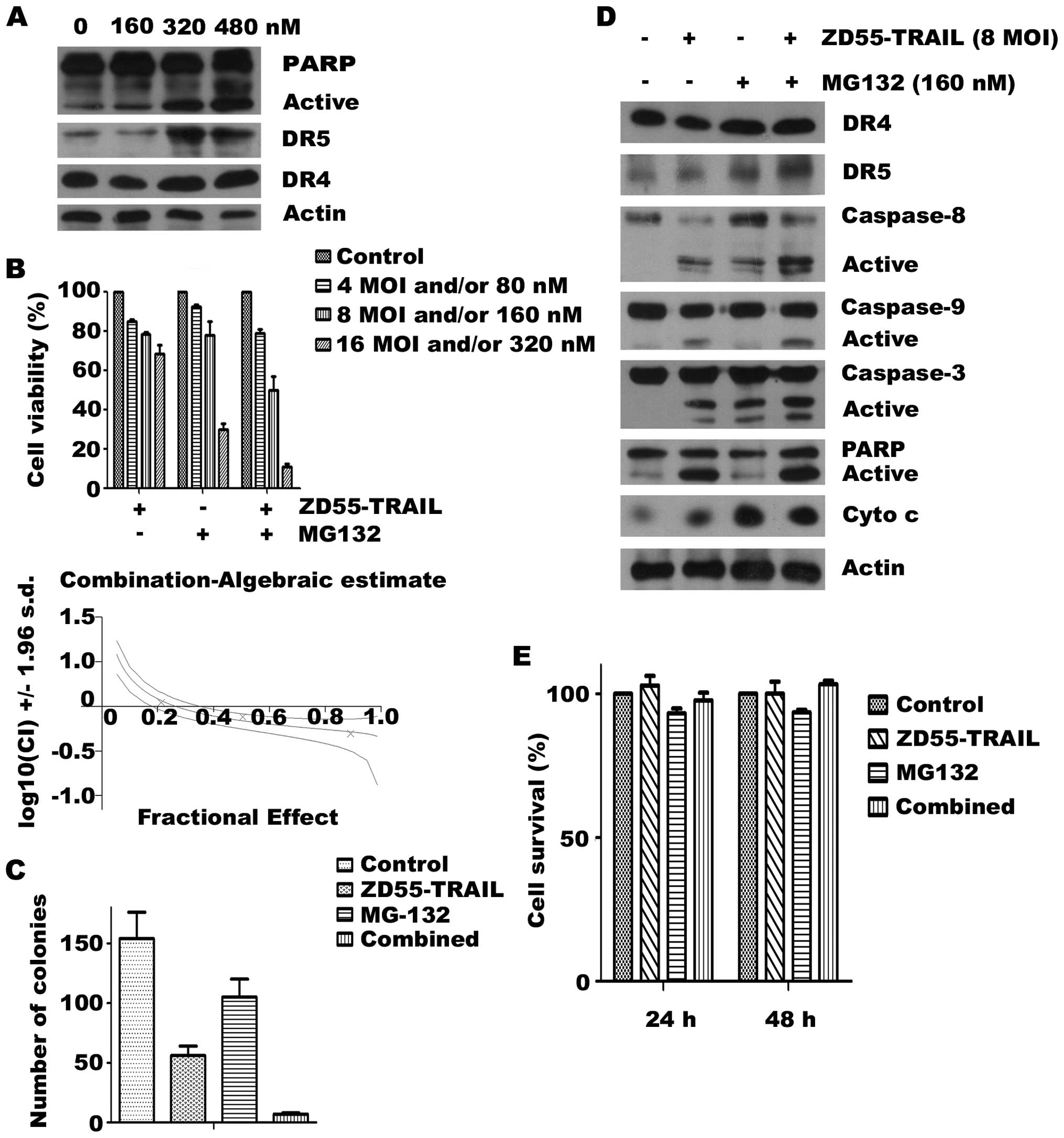|
1
|
Kyle RA: Multiple myeloma: an odyssey of
discovery. Br J Haematol. 111:1035–1044. 2000. View Article : Google Scholar : PubMed/NCBI
|
|
2
|
Brenner H, Gondos A and Pulte D: Expected
long-term survival of patients diagnosed with multiple myeloma in
2006–2010. Haematologica. 94:270–275. 2009.
|
|
3
|
Barlogie B, Attal M, Crowley J, et al:
Long-term follow-up of autotransplantation trials for multiple
myeloma: update of protocols conducted by the Intergroupe
Francophone du Myelome, Southwest Oncology Group, and University of
Arkansas for Medical Sciences. J Clin Oncol. 28:1209–1214. 2010.
View Article : Google Scholar
|
|
4
|
Hideshima T and Anderson KC: Molecular
mechanisms of novel therapeutic approaches for multiple myeloma.
Nat Rev Cancer. 2:927–937. 2002. View
Article : Google Scholar : PubMed/NCBI
|
|
5
|
Hellwig CT and Rehm M: TRAIL signaling and
synergy mechanisms used in TRAIL-based combination therapies. Mol
Cancer Ther. 11:3–13. 2012. View Article : Google Scholar : PubMed/NCBI
|
|
6
|
Herbst RS, Eckhardt SG, Kurzrock R, et al:
Phase I dose-escalation study of recombinant human Apo2L/TRAIL, a
dual proapoptotic receptor agonist, in patients with advanced
cancer. J Clin Oncol. 28:2839–2846. 2010. View Article : Google Scholar : PubMed/NCBI
|
|
7
|
Gajate C and Mollinedo F: Edelfosine and
perifosine induce selective apoptosis in multiple myeloma by
recruitment of death receptors and downstream signaling molecules
into lipid rafts. Blood. 109:711–719. 2007. View Article : Google Scholar : PubMed/NCBI
|
|
8
|
Mitsiades CS, Treon SP, Mitsiades N, et
al: TRAIL/Apo2L ligand selectively induces apoptosis and overcomes
drug resistance in multiple myeloma: therapeutic applications.
Blood. 98:795–804. 2001. View Article : Google Scholar : PubMed/NCBI
|
|
9
|
Gazitt Y: TRAIL is a potent inducer of
apoptosis in myeloma cells derived from multiple myeloma patients
and is not cytotoxic to hematopoietic stem cells. Leukemia.
13:1817–1824. 1999. View Article : Google Scholar : PubMed/NCBI
|
|
10
|
Jazirehi AR, Ng CP, Gan XH, Schiller G and
Bonavida B: Adriamycin sensitizes the adriamycin-resistant
8226/Dox40 human multiple myeloma cells to Apo2L/tumor necrosis
factor-related apoptosis-inducing ligand-mediated (TRAIL)
apoptosis. Clin Cancer Res. 7:3874–3883. 2001.
|
|
11
|
Vitovski S, Chantry AD, Lawson MA and
Croucher PI: Targeting tumour-initiating cells with TRAIL based
combination therapy ensures complete and lasting eradication of
multiple myeloma tumours in vivo. PLoS One. 7:e358302012.
View Article : Google Scholar
|
|
12
|
Hermiston TW and Kuhn I: Armed therapeutic
viruses: strategies and challenges to arming oncolytic viruses with
therapeutic genes. Cancer Gene Ther. 9:1022–1035. 2002. View Article : Google Scholar : PubMed/NCBI
|
|
13
|
Zhang ZL, Zou WG, Luo CX, et al: An armed
oncolytic adenovirus system, ZD55-gene, demonstrating potent
antitumoral efficacy. Cell Res. 13:481–489. 2003. View Article : Google Scholar : PubMed/NCBI
|
|
14
|
Dong F, Wang L, Davis JJ, et al:
Eliminating established tumor in nu/nu nude mice by a tumor
necrosis factor-α-related apoptosis-inducing ligand-armed oncolytic
adenovirus. Clin Cancer Res. 12:5224–5230. 2006.PubMed/NCBI
|
|
15
|
Pei Z, Chu L, Zou W, et al: An oncolytic
adenoviral vector of Smac increases antitumor activity of TRAIL
against HCC in human cells and in mice. Hepatology. 39:1371–1381.
2004. View Article : Google Scholar : PubMed/NCBI
|
|
16
|
Wang SB, Tan Y, Lei W, et al: Complete
eradication of xenograft hepatoma by oncolytic adenovirus ZD55
harboring TRAIL-IETD-Smac gene with broad antitumor effect. Hum
Gene Ther. 23:992–1002. 2012. View Article : Google Scholar : PubMed/NCBI
|
|
17
|
Meng H, Jin Y, Liu H, You L, Yang C, Yang
X and Qian W: SNS-032 inhibits mTORC1/mTORC2 activity in acute
myeloid leukemia cells and has synergistic activity with perifosine
against Akt. J Hematol Oncol. 6:182013. View Article : Google Scholar : PubMed/NCBI
|
|
18
|
Chauhan D, Velankar M, Brahmandam M, et
al: A novel Bcl-2/Bcl-XL/Bcl-w inhibitor ABT-737 as
therapy in multiple myeloma. Oncogene. 26:2374–2380.
2007.PubMed/NCBI
|
|
19
|
Kuhn DJ, Berkova Z, Jones RJ, et al:
Targeting the insulin-like growth factor-1 receptor to overcome
bortezomib resistance in preclinical models of multiple myeloma.
Blood. 120:3260–3270. 2012. View Article : Google Scholar : PubMed/NCBI
|
|
20
|
Tagoug I, Sauty De Chalon A and Dumontet
C: Inhibition of IGF-1 signalling enhances the apoptotic effect of
AS602868, an IKK2 inhibitor, in multiple myeloma cell lines. PLoS
One. 6:e226412011. View Article : Google Scholar : PubMed/NCBI
|
|
21
|
Ikeda H, Hideshima T, Fulciniti M, et al:
PI3K/p110δ is a novel therapeutic target in multiple myeloma.
Blood. 116:1460–1468. 2010.PubMed/NCBI
|
|
22
|
Maiso P, Liu Y, Morgan B, et al: Defining
the role of TORC1/2 in multiple myeloma. Blood. 118:6860–6870.
2011. View Article : Google Scholar : PubMed/NCBI
|
|
23
|
Park S, Chapuis N, Tamburini J, et al:
Role of the PI3K/AKT and mTOR signaling pathways in acute myeloid
leukemia. Haematologica. 95:819–828. 2010. View Article : Google Scholar : PubMed/NCBI
|
|
24
|
Oh WJ and Jacinto E: mTOR complex 2
signaling and functions. Cell Cycle. 10:2305–2316. 2011. View Article : Google Scholar : PubMed/NCBI
|
|
25
|
Hougardy BM, Maduro JH, van der Zee AG, de
Groot DJ, van den Heuvel FA, de Vries EG and de Jong S: Proteasome
inhibitor MG132 sensitizes HPV-positive human cervical cancer cells
to rhTRAIL-induced apoptosis. Int J Cancer. 118:1892–1900. 2006.
View Article : Google Scholar : PubMed/NCBI
|
|
26
|
Seol DW: p53-Independent up-regulation of
a TRAIL receptor DR5 by proteasome inhibitors: a mechanism for
proteasome inhibitor-enhanced TRAIL-induced apoptosis. Biochem
Biophys Res Commun. 416:222–225. 2011. View Article : Google Scholar : PubMed/NCBI
|
|
27
|
Bais S, Bartee E, Rahman MM, McFadden G
and Cogle CR: Oncolytic virotherapy for hematological malignancies.
Adv Virol. 2012:1865122012. View Article : Google Scholar : PubMed/NCBI
|
|
28
|
Raus S, Coin S and Monsurrò V: Adenovirus
as a new agent for multiple myeloma therapies: opportunities and
restrictions. Korean J Hematol. 46:229–238. 2011. View Article : Google Scholar : PubMed/NCBI
|
|
29
|
Naik S, Nace R, Federspiel MJ, Barber GN,
Peng KW and Russell SJ: Curative one-shot systemic virotherapy in
murine myeloma. Leukemia. 26:1870–1878. 2012. View Article : Google Scholar : PubMed/NCBI
|
|
30
|
Senac JS, Doronin K, Russell SJ, Jelinek
DF, Greipp PR and Barry MA: Infection and killing of multiple
myeloma by adenoviruses. Hum Gene Ther. 21:179–190. 2010.
View Article : Google Scholar : PubMed/NCBI
|
|
31
|
Chen CY, Senac JS, Weaver EA, et al:
Species D adenoviruses as oncolytics against B-cell cancers. Clin
Cancer Res. 17:6712–6722. 2011. View Article : Google Scholar : PubMed/NCBI
|
|
32
|
Catlett-Falcone R, Landowski TH, Oshiro
MM, et al: Constitutive activation of Stat3 signaling confers
resistance to apoptosis in human U266 myeloma cells. Immunity.
10:105–115. 1999. View Article : Google Scholar : PubMed/NCBI
|
|
33
|
Tu Y, Gardner A and Lichtenstein A: The
phosphatidylinositol 3-kinase/AKT kinase pathway in multiple
myeloma plasma cells: roles in cytokine-dependent survival and
proliferative responses. Cancer Res. 60:6763–6770. 2000.PubMed/NCBI
|
|
34
|
Hsu J, Shi Y, Krajewski S, et al: The AKT
kinase is activated in multiple myeloma tumor cells. Blood.
98:2853–2855. 2001. View Article : Google Scholar : PubMed/NCBI
|
|
35
|
Bruno B, Giaccone L, Rotta M, Anderson K
and Boccadoro M: Novel targeted drugs for the treatment of multiple
myeloma: from bench to bedside. Leukemia. 19:1729–1738. 2005.
View Article : Google Scholar : PubMed/NCBI
|
|
36
|
Sprynski AC, Hose D, Caillot L, et al: The
role of IGF-1 as a major growth factor for myeloma cell lines and
the prognostic relevance of the expression of its receptor. Blood.
113:4614–4626. 2009. View Article : Google Scholar : PubMed/NCBI
|
|
37
|
Huo J, Xu S, Lin B, Chng WJ and Lam KP:
Fas apoptosis inhibitory molecule is upregulated by IGF-1 signaling
and modulates Akt activation and IRF4 expression in multiple
myeloma. Leukemia. 27:1165–1171. 2013. View Article : Google Scholar : PubMed/NCBI
|
|
38
|
Strömberg T, Ekman S, Girnita L, et al:
IGF-1 receptor tyrosine kinase inhibition by the cyclolignan PPP
induces G2/M-phase accumulation and apoptosis in
multiple myeloma cells. Blood. 107:669–678. 2006.PubMed/NCBI
|
|
39
|
Thaci B, Ulasov IV, Wainwright DA and
Lesniak MS: The challenge for gene therapy: innate immune response
to adenoviruses. Oncotarget. 2:113–121. 2011.PubMed/NCBI
|
|
40
|
Tamanini A, Nicolis E, Bonizzato A,
Bezzerri V, Melotti P, Assael BM and Cabrini G: Interaction of
adenovirus type 5 fiber with the coxsackievirus and adenovirus
receptor activates inflammatory response in human respiratory
cells. J Virol. 80:11241–11254. 2006. View Article : Google Scholar : PubMed/NCBI
|
|
41
|
Verdino P, Witherden DA, Havran WL and
Wilson IA: The molecular interaction of CAR and JAML recruits the
central cell signal transducer PI3K. Science. 329:1210–1214. 2010.
View Article : Google Scholar : PubMed/NCBI
|
|
42
|
David E, Sinha R, Chen J, Sun SY, Kaufman
JL and Lonial S: Perifosine synergistically enhances TRAIL-induced
myeloma cell apoptosis via up-regulation of death receptors. Clin
Cancer Res. 14:5090–5098. 2008. View Article : Google Scholar : PubMed/NCBI
|
|
43
|
Surget S, Chiron D, Gomez-Bougie P, et al:
Cell death via DR5, but not DR4, is regulated by p53 in myeloma
cells. Cancer Res. 72:4562–4573. 2012. View Article : Google Scholar : PubMed/NCBI
|
|
44
|
Voortman J, Resende TP, Abou El Hassan MA,
Giaccone G and Kruyt FA: TRAIL therapy in non-small cell lung
cancer cells: sensitization to death receptor-mediated apoptosis by
proteasome inhibitor bortezomib. Mol Cancer Ther. 6:2103–2112.
2007. View Article : Google Scholar : PubMed/NCBI
|
|
45
|
Mitsiades N, Poulaki V, Mitsiades C and
Tsokos M: Ewing’s sarcoma family tumors are sensitive to tumor
necrosis factor-related apoptosis-inducing ligand and express death
receptor 4 and death receptor 5. Cancer Res. 61:2704–2712.
2001.
|















